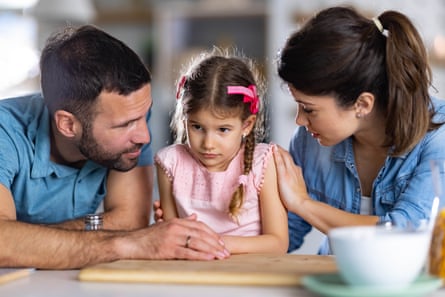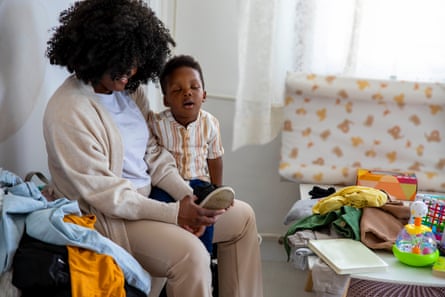‘We really lean on each other’: how to be good parents after a breakup | Parents and parenting

After Anna Whitehouse and Matt Farquharson had their second daughter, six years ago, they realised something: it is not financially viable to have two young children in the UK. Farquharson has run the numbers. “If you are the most average couple in the UK, living in an average place, with average bills, on average wages, and you add a grand a child a month for childcare, you’re in debt before you’ve even gone to work. You’re in debt just by existing,” he says. At one point, Whitehouse worked out that she was “earning about £5 a month after childcare costs”.
This realisation drove them to start a campaign, Flex Appeal, to push for more flexibility for working parents so they would not be “forced to make a choice between earning a living and having a family”. Blogging as Mother Pukka about the realities of parenthood, Whitehouse had built a large following. Both journalists, the couple – with Farquharson as Papa Pukka – went on to co-write parenting books: Parenting the Sh*t out of Life and Where’s My Happy Ending? They also host the podcasts Dirty Mother Pukka and Where’s My Happy Ending?
But the realities of trying to hold it together led to their separation earlier this year. They have now published a pair of books, Divide and Conquer: the first focuses on the impact of children on their lives, the second is a guide on how to look after them post-divorce.
I meet Whitehouse and Farquharson in the house they share, although not at the same time. It is extraordinarily tidy, which in itself is – the way they tell it – a good argument for getting divorced. “There used to be so many points of ridiculous domestic tension,” says Farquharson. “Everything runs a bit more smoothly when you’re just doing it yourself.”
Whitehouse is keen “not to give a rose-tinted glamorisation,” to their divorce after 17 years of marriage. “The breakdown of any relationship comes with pain. But yeah, if something breaks on my watch, I just fix it.” They don’t want to sound blase, but in these books, they seem to have written something like a blueprint for successful co-parenting after divorce. I think it’s incredibly useful because it creates the expectation that you can always stay civilised, and the permission not to turn everything into a drama. Here is their guide to getting it right.
1. It doesn’t have to be amicable to be reasonable
Whitehouse queries whether there is any such thing as a truly mutual split, but says: “We come to conclusions at different times, we feel things at different times. But it can be reasonable. We can all be reasonable.” They cite techniques for taking the heat out of a difficult conversation. Some are borrowed from protest movements – agree a hand gesture for “let’s do this later” and back away. Others are borrowed from hostage negotiation – five minutes of active listening, where you don’t interrupt, then you take two and a half minutes to reflect on what has been said, then you get a turn. Whatever you need to say, there is a reasonable way to say it. And if you can avoid it, do not argue by text.
2. Put the children first
As Whitehouse says, separating parents should “constantly prioritise how to anchor the two little people who didn’t choose this. We chose this.” But it is not always obvious in the moment what putting the kids first would look like, and even when it is, that doesn’t mean it’s easy. “I think there was slightly more selfishness to divorce in the past,” she says. “Now, people – even through affairs, even through the trauma of breakup – are prioritising the children’s feelings over their own.”
My parents had a custody battle over everything, down to the Magimix. Every Monday for 15 years after their separation, my dad would ask how often my mum used the Magimix, and my sister and I would have to make up some fake culinary endeavour because the true answer was never. What I’m saying is, don’t look at your own behaviour through the prism of the previous generations: our parents and their parents were often unbelievably bad at this. Look at it through the eyes of your kids’ future therapist. “You need to allow yourself to fade into the background, to get to the stage of being amicable,” says Farquharson.

3. Don’t be melodramatic when you tell the children …
Farquharson tells the story of a friend whose parents split up. “She had three siblings. The parents sat them down and said: ‘We’ve got to have a talk.’ So they all knew something heavy was coming and the parents immediately burst into tears. All the kids started crying, and this image lodged in their brains: this is terrible, everything’s awful. So, we had it in our minds that we had to sell it to them.” He admits though: “It is the definitely the hardest conversation, the one you dread.”
Whitehouse elaborates: “We did a structural shift for three months beforehand, where we naturally lived apart. So it wasn’t a dramatic pull-the-rug.” When they told their daughters, who were six and 10: “We gave them the space to ask a lot of questions, and they did, but it was nothing huge, no massive drama.”
4. … but don’t be too breezy
“It’s far better to be the product of a broken family than living in a broken home,” Whitehouse says. The meaningful distinction is not between married and divorced, but between a happy and an unhappy home. Nevertheless, as one-off events go, other than injury or bereavement, you splitting up might well be the worst thing that’s happened to your kids. It is vital not to blast through it without leaving any space for them to be upset.
So many principles around post-divorce parenting are self-evident but impossible. “Guilt is the enemy of good parenting,” people say, but what is the alternative? Feeling guilty but pretending not to? Eradicating shame from your emotional repertoire?
And what about: “Keep on telling the kids that it’s not their fault”? “There’s loads of research that shows that the second kid in particular has a rupturing effect on the family setup,” Farquharson says. One meta study looked at “about 200 pieces of research, from Asia, Europe and the US, gay and straight couples, and across all sorts of family setups. And in every one of those, they said that kids had a detrimental effect on relationships. Which is a difficult thing for people to accept, right? Because you love your kids.” Even so, it’s still not the kids’ fault you’re getting divorced. It’s your fault – they were just there.
5. Split access 50:50 if possible
It might not feel fair, especially if you previously did more of the childcare. When my ex and I split up, our son was eight and our daughter six, and neither of us could cope with five days without them, so we ended up on a bizarre fortnightly 2:2:3 arrangement that we are still on eight years later, and only our son reliably understands. “The separation anxiety is not to be underestimated,” Whitehouse says. “It’s so painful. And you have moments of euphoria, thinking, ‘I’ve got my time back’, but actually, you probably did just need 15 minutes.”
“It’s such a weird conflict,” Farquharson agrees. “There are times when you’re desperate to get out of the door, but five minutes later you really miss them.”
I tell them I remember dropping my kids at school if I wasn’t going to see them for three days, and working in earshot of the playground all day. It was wretched. But bartering for more time doesn’t make it any easier and, in the long term, Farquharson says: “It affects the kids’ relationship with the parent they see less of, and it affects how that parent parents the kids. Because you’re trying to make up for lost time the whole time. You’re trying to make everything spectacular.”
I can’t stress this enough: don’t sweat units of an hour, be flexible around family events, be generous around your ex’s birthday and Father’s Day and whatnot. I have no greater single regret than the time I took the kids to see their dad on Father’s Day morning, but then let him drive off to see his own dad without them, because it was “my” Sunday. Everybody was sad. My own dead dad would have been turning in his grave. The faster you get to a presumption of goodwill, the easier it will be on everybody.

6. Think carefully about whether you need to involve lawyers
Since the no-fault divorce law came into force in England and Wales in 2022, it has been much easier to do most of the paperwork online. “We spoke to lawyers in the beginning and it was a horrible conversation,” Farquharson says. “The one I saw said: ‘If it all goes smoothly, it will cost you £30,000. If it goes badly, it’ll be twice or three times that.’ And they generally come to the same conclusion, which is to split it all in half.”
“I saw one lawyer and the first letter she wrote was so abrasive, so dramatic,” Whitehouse says. “We had worked so hard, personally, not to blow things up. You’ve got to protect what you’ve created yourself. The lawyers aren’t there to save you.”
“It’s a bit more faff and effort to do it yourself, but it’s better,” Farquharson concludes.
7. Bird nesting seems to work
This is where you keep the family home and the kids stay in it all the time, while the parents alternate: some people rent another place and also alternate in that, others sofa surf for the time they are not in the nest. It sounds like an expensive way to do it, though selling a house, particularly in the middle of an interest rate hike, and buying two smaller places is also expensive. It probably wouldn’t survive one or both parents getting a new partner. But it can work as a bridging arrangement.
Plainly, it maintains stability for the kids, but it can also be emotionally protective for the adults, as well as postponing the division of the marital acquest – defined as property bought or given, but not inherited – which is the other things divorcing couples fight about. If you both have a family home to live in after the split and ferry the kids around between you, when the children aren’t with you, “you have these empty rooms, children’s toys everywhere, you’re walking past this emptiness all weekend and mourning the loss of the child in the nest,” says Whitehouse.
8. Try not to be touchy
“The bit that hurts me, if I’m being honest,” Whitehouse says, “is I come back into the family home and I’m ‘Mamma’ – and for the first 24 hours, they’ll go, ‘P-P-P, sorry, Mamma.’ It takes them a while to get back into the routine of me being here.” It used to go through me like a dart when the kids said “home” and meant their dad’s house, not mine. As harsh as it sounds, you just have to pull yourself together. You can’t strew your children’s lives with emotional landmines.
9. Maintain some rituals
“We have a handover on Sundays where we have a big lunch,” Whitehouse says (they do week-on, week-off). “We get quite competitive about cooking and have a lovely day. If there’s an event at school, we both go. There’s so much in a child’s calendar that you naturally cross over. There are certain friends we still see together.” It’s one thing telling the kids that you still get on with your ex, but they need to see it.
10. Have separate channels for big questions and small questions
“We’ve got a relationship WhatsApp group, because it is a relationship, and it will be till death do us part. There is no taking away from that,” Whitehouse says. “But we also have a family WhatsApp group, which is where Matt will tell me if he gets a call from the school but it’s my week. We separate the emotional and the practical, so we can be in the right head space when we look at the message.” Neither Whitehouse nor Farquharson has met anyone else yet.

11. Don’t be competitive
If you get into one-upmanship on presents, holidays, sleepovers or parties, you will bankrupt yourselves. Keep a joint account for shared expenses. My ex and I still do birthday and Christmas presents together, though that annoys our kids, who contend that getting two of everything was one of the major selling points of an irretrievable relationship breakdown.
12. There are upsides
To the family dynamic, that is. Farquharson says: “A common point of tension is the parenting arguments, all the inane stuff – what time they go to bed, how fast they get their shoes on. It’s quite common when you’re not divorced that one parent tries to be the fun one and doesn’t do things that need to be done, while the other ends up super-strict. Probably as a result of this, we’ve levelled out our parenting a bit.”
Whitehouse adds: “With distance, I can see the bits that he does brilliantly. He’s seen the things I do brilliantly. We used to wrangle over our differences and now we really lean on each other.”


